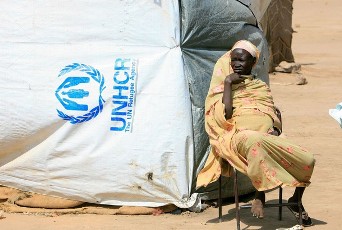Sudan urged to renew residence permits for UN humanitarian staff in Darfur
August 6, 2013 (KHARTOUM) – Sudan’s refusal to renew the residence permits of 20 UNHCR staffers impact negatively humanitarian activities in Darfur region where there are some two million internally displaced persons (IDPs) affected by the 10- year conflict.

The twenty staffers “have not been renewed, despite extended follow-up by UNHCR with the relevant Government authorities, forcing it to scale down our operations”, UN officials said.
In order to highlight the importance of the situation, the director of UN Information Service in Geneva, briefed the media about the case together with spokespersons for the High Commissioner for Human Rights (OHCHR), the UN High Commissioner for Refugees (UNHCR), the Office for the Coordination for Humanitarian Affairs, the World Food Programme (WFP) and the International Organization for Migration (IOM).
Also in Khartoum, UN permanent resident and humanitarian coordinator Ali Al-Zatari and UNHCR representative in Sudan Kai Nielsen, in a joint statement released simultaneously with Geneva press conference, regretted that “humanitarian activities for (IDPs) in Darfur have had to be scaled down” as a result of Khartoum’s refusal to renew the twenty residence permits.
Al-Zatari and Nielsen underlined that the humanitarian situation in Darfur remains critical because there are still long-term IDPs in the different camps across the region, but also due to the recent waves of displacement cause by the tribal violence and rebel clashes with the government forces.
“The inability of UNHCR to continue implementing its activities will directly impact projects related to health, education, basic services and livelihoods, the provision of emergency shelter and non-food items, and on the verification of returnees”, they said.
They further echoed an appeal the UN agencies launched from Geneva, urging Sudanese authorities to reconsider its decision and renew the permits for all the UNHCR staff, so as to fully resume their activities in Darfur.
Sudanese officials at different occasions regretted the establishment of IDPs camps in Darfur following a counter-insurgency campaign in 2003-2005 that resulted in the displacement of some four millions of civilians.. The government said the camps are manipulated by rebels.
Following the signing of the Doha Document for Peace in Darfur, Khartoum said the closure of IDPS camps tops its agenda and urged the international community and donors to fund development and reconstruction programmes instead of delivering humanitarian assistance.
However, Sudan pledged to facilitated the activities of UN agencies and aid groups and to not restrict their access to the different areas. It also committed itself to cooperate with agencies and groups intending to implement projects in line with a development strategy endorsed in a donor meeting held in Doha last April.
WASHINGTON CONDEMNS DECISION
In Washington the State Department backed the call of the UN agencies and urged the Sudanese government to “immediately renew” the necessary work permits for twenty UNHCR international staff providing humanitarian assistance and protection to IDPs in Darfur.
US State Department spokesperson Jen Psaki said that Sudan’s failure to renew UNHCR permits “is particularly unfortunate, as it comes in the context of deteriorating security and humanitarian conditions in Darfur and the forcible displacement of over 300,000 persons this year”.
UN agencies said the tribal fighting that erupt in Darfur since January of this year forced over 300.000 people to flee their home in different areas in the region mainly in North Darfur. They underscored that the number of IDPs this year exceeded the total number of those who fled violence during the previous two years.
“This recent tightening of restrictions on humanitarian actors in Darfur, including UN agencies and nongovernmental organizations, raises serious concerns about the Government of Sudan’s willingness to uphold the promises it made in the Doha Document for Peace in Darfur, and raises questions regarding the viability of this peace accord”, he stressed on Tuesday.
Psaki further urged the Sudanese government and rebel groups to “engage without preconditions in an effective and inclusive political process to achieve a peaceful resolution to the conflict”.
Last month, the UN Security Council rejected demands by Sudanese rebel groups for a comprehensive process leading to remove the regime of president Omer Bashir and asked them to negotiate a peace deal under the Doha framework agreement.
The strongly worded statement also called on Khartoum to allow UN agencies and all humanitarian actors “unfettered humanitarian access to all parts of Darfur to protect and to assist the victims of the conflict and to support the implementation of the peace agreements”.
(ST)
